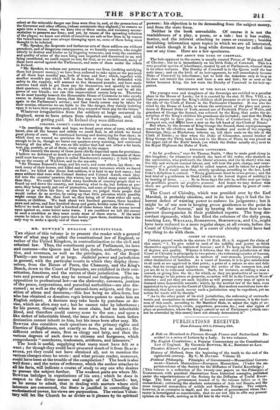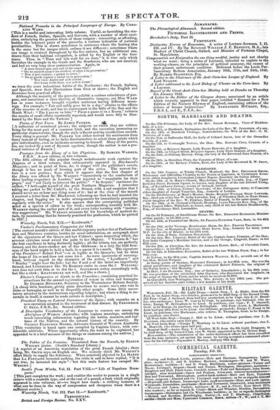PUBLICATIONS RECEIVED.
Prom February 18th to February 24th.
Boors.
A Ride on Horseback to Florence through France and Switzerland. De-
scribed in a series of Letters by a Lady. In two volumes.
The English Constitution; a Popular Commentary on the Constitutional
Law of England. By GEORGE BOWYER, M.A., Barrister-at-Law. Theodore Earner's Lyre and Sword.
History of Holland, from the beginning of the tenth to the end of the eighteenth century. By C. M. Davits. Volume II.
Political Philosophy. Principles of Government—Monarchical Govern- ment—Eastern Monarchies—European Monarchies. (Under the su- perintendence of the Society for the Diffusion of Useful Knowledge.) [This volume is a collection of the twenty-one papers on the Principles of Government, with practical illustrations from historical examples, published under the superintendence of the Society for the Diffusion of Useful Know- ledge. The form of government treated of in the volume before us is the monarchical ; embracing the absolute autocracies of Asia and Russia, and the more tempered monarchies of middle and Southern Europe. The subject, however, is so extensive in itself, and the number of governments whose cha- racter is investigated so considerable, that we are not able to offer any present opinion on the work, arriving as it did late in the week.]
National Proverbs in the Principal Languages of Europe. By CARO- LINE WARD.
This is a useful and interesting little volume. Useful, as furnishing the stu- dent of French, Italian, Spanish, and German, with a number of short exer- cises, embodying the genuine idiom of those tongues : interesting, as affording, besides the inherent point of the proverbs, a curious indication of national peculiarities. This is shown sometimes in sentences where the leading idea is the same but the images which enforce it are different ; sometimes where one image is retained throughout by the five nations, but an additional one, drawn from their habitual occupation, is added by the English or the Ger- mans. Thus, in " Time and tide wait for no man," it is time only which furnishes the example to the Gauls and the Sontherns, who are not nautical, and had no very busy river communication. Again, in •• A man cannot spin and reel nt the same time," " On ne =unlit sooner les cloches, et idler a la procession,"
" Non si pub cantare, e portar Is croce," " No se puede repicar y ander en la procession," " Wet viele Amter auf sich nimmt.
Der kann nicht thus, was jedem ziemt."
we trace the more industrious habits of the Northerns: the French, Italians, and Spanish, draw their illustrations from fetes or shows; the English and .Germans from practical affairs.
Although the majority of the proverbs exhibit a curious coincidence of pur- pose, and sometimes a close identity of illustrative imagery, yet Miss WARD has in some instances brought together sentences having different mean- ings. For example, " Fair and softly goes far in a day," alludes to the effects of the suaviter in modo, and has its counterpart in the fable of the Sun and the North Wind : " Pas a pas on va loin," " Passo a pasao si va a Roma," enforces the results of small efforts constantly repeated, and would more fitly be illus- trated by the Hare and the Tortoise.]
Poems of Past Years. By JAMES PARKER. 411
[A collection of occasional poems; the subjects on which they are written being for the most part of a common kind, and the execution possessing no particular characteristic, though the style is fluent and the versification smooth. Every. thing is general: Mr. PARKER has either derived his sentiments from fancy instead of feeling, or he lacks discrimination to select those points which give individuality, even in incidents occurring to himself. Many of the poems, too, are dashed by a sort of Byronic egotism, though the author is not a pro- fessed imitator of BYROIC]
Passages from the Diary of a late Physician. By SAMUEL WARREN, F.R.S. A new edition, in two volumes.
[The fifth edition of this popular though melodramatic work contains the chapters of a third volume, that subsequently appeared in Blackwood's Magazine ; and in point of form, &c. it ranges with the publisher's novels, though it has no mark of forming part of the series. The newest fea- ture is a new preface; from which it appears that the first chapter of the Diary was offered by Mr. WARREN "successively to the conductors of three leading magazines in London," and rejected as " unsuitable for their pages," and "not likely to interest the public." "In despair," continues the author, ".1 bethought myself of the great Northern Magazine. I remember taking my packet to Mr. Cadell's, in the Strand, with a sad suspicion that I should never see or hear any thing more of it : but at the close of the month I received a letter from Mr. Blackwood, informing me that be had inserted the chapter, and begging. me to make arrangements for immediately proceeding regularly with the senes." It also appears that the enterprising publisher acted as a species of editor to the work; corresponding monthly with Mr. WARREN dung the earlier part of it, and every letter teeming with "instruc- tive suggestions." Mr. WARREN accounts for his knowledge of medical de- tails, by mentioning that he formerly practised the profession, which he quitted in 1827.]
Waves-leg Novels, Vol. XII.—" Kenilworth."
Vacher's Parliamentary Companion for 1842.
[The current month's edition of this useful sixpenny pocket-list of Parliament- men and Ministers contains, besides its usual information, an autograph sheet of the signatures of the Queen and her Cabinet : upon inspecting which, the severest criticism must award the palm to her Majesty. " Victoria R." has the first excellence in being distinctly legible; all the letters, too, are perfectly formed, and the down-strokes are of due thickness : in a lady the bold firm- ness of the hand might be held a fault, in a queen it is a merit. The signature of the Premier—" Robert Peel"—is as legible as the Queen's; but he blots the loops of his ee and does not cross his t. As mere specimens of running- hand, without regard to the character of the writer, " Lyndhurst" and " Stanley " might bear the bell; but the S and a of the latter are imperfectly formed, and LYNDHURST like Sir ROBERT Omits IO cross the t. WELLING- TON does not omit this, or to dot the i. Gocrannuy writes exceedingly well, but like a clerk ; KNATCHBULL not well, and like a clown.]
Elector's Companion or Guide to the Franchise; containing practical in- structions for the annual registration of voters in cities and boroughs. By GEORGE HUGGETT, Secretary to the Westminster Reform Society. [A cheap little brochure, giving plain directions to secure one's own vote in cities or boroughs, as well as to disqualify other people. Some little uncer- tainty attaches to the instructions regarding lodgers; but where a thing is un- certain in itself, it cannot be made certain in description.]
Practical Essay on Lateral Curvature of the Spine; with remarks on a new operation adopted in the treatment of that disease. By FREDERICK C. SKEY, F.R.S., &c. Second edition.
Descriptive Vocabulary of the Language in common use among the Aborigines of Western Australia; with copious meanings, embodying much interesting information regarding the habits, manners, and cus- toms of the Natives, and the natural history of the country. By GEORGE FLETCHER MOORE, Advocate-General of Western Australia.
[This vocabulary is based upon one compiled by Captain GREY, with con- siderable additions. Where opportunity offers, the word to be explained has appended to it a brief account of the things or customs among the natives.] SERIALS.
The Fables of La Fontaine. Translated from the French, by Emus WRIGHT junior. (Smith's Standard Library.) [A reprint of an American translation of the great French fabulist ; there being, Mr. SMITH says, ne English one. We scarcely think Mr. WRIGHT'S effort likely to supply the deficiency. When somebody objected to LA HARPE that LA FONTAINE invented nothing, the critic is said to have replied, " It is not true, he invented his style " : but this main feature has escaped Mr. WRIGHT.]
Scott's Prose Works, Vol. IL Part VIII.—" Life of Napoleon Bona- parte." [This part completes the work ; and enables the reader to possess in a single octavo with a readable type, and at the cost of a pound, a book which originally appeared in nine volumes, at—we forget how much : a striking instance of what can be done in the way of compression and cheapness when there is a sufficient motive.] Waverley Novels, Vol. III. Part IL—" Kenilworth."
PERIODICALS.
British and Foreign Review, No. XXV.
ALMANACKS.
The Phrenological Abnanack. Second edition.
PICTORIAL ILLUSTRATIONS AND PRINTS.
Brockedon's Italy, Part IL PAMPHLETS.
Distinctive Errors of Romanian. A series of Lecture-Sermons, I. IL 11I. and 1V. By the Reverend WILLIAM J. E. BENNETT, M.A., late Student of Christ Church, Oxford, and Minister of Portman Chapel, St. Marylebone.
Compensation not Emigration the one thing needful, justice and not charity what we want : being a series of Lectures, intended to explain to the working-classes, on the principles of political economy, the causes of their present unfortunate condition. Delivered before the Leeds Par- liamentary Reform Association, January 10th, 17th, and 24th, 1842. By HAMER STANSPELD, Esq. A Letter to the Chairman of the Anti-Corn-law League of England. By Lord NUGENT.
A Letter addressed to the Lord Bishop of Chester on the Corn-laws. By a Layman.
Report of the Great Anti-Corn-law Meeting held at Dundee on Thursday 6th January 1842.
A Letter to the Editor of the Glasgow Argus ; occasioned by an article which recently appeared in that paper, entitled " Reasons for a New Edition of the Nursery Rhymes of England, containing notices of the defects of former impressions." By ALEXANDER WGIIAPP, Esq., F.R.S. L. and E., F.A.S., &c.



























 Previous page
Previous page